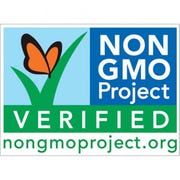A guide to common places where genetically modified ingredients hide and non-GMO labels. Plus, Gary Hirshberg, CEO of Stonyfield Farms, on why it's important to fight GMOs. Learn how to stop GMOs by emailing government officials, joining Right2Know and visiting Food Democracy Now.

Buyers dedicated to non-GMO foods probably know the four main ingredients that are typically genetically engineered: corn, soy, canola, and cotton. But what about the hundreds of not-so-obvious additives derived from GMOs? Keep an eye out for these, and check Non-GMO Shopping Guide for more.
Glucose
A simple sugar that can be naturally derived or chemically made from corn.
Hides in: Many sport drinks and soft drinks, baked goods, and sweets.
Lecithin
An emulsion derived from soy.
Hides in: Chocolates, ice creams, and desserts.
Maltodextrin
An additive made from starch (usually corn) used as a fat substitute, flavor stabilizer, and thickening agent.
Hides in: Instant soups, soda, candy, beer, and other processed goods
Certifiably non-GMO

Beyond purchasing USDA Organic, the Non-GMO Project label lets you know products passed through a rigorous third-party GMO-free verification system. Companies such as Silk, Nature’s Path Organic, Eden, Lundberg Family Farms, and Blue Marble Brands are already sporting the stamp.
Take a stand
Gary Hirshberg, CEO of Stonyfield Farm, on fighting GMOs
“What people need to understand with GE, or genetically engineered, [aka GMO] crops is that the seeds are owned by chemical companies. When we sanction the unrestricted use of GE crops, we’re sanctioning the unrestricted use of these chemicals, which are already making us sick.
I’m hopeful. As I travel the country, I hear that people want freedom of choice. Eighty-seven percent of Americans say that genetically modified foods should be labeled and that they don’t want to buy GE crops and food grown from GE seeds. Consumers care, farmers care, even nonorganic farmers care because they don’t want to be told what kind of seeds to grow and they don’t want to pay the higher costs demanded by these companies. We need to marshal a grassroots effort. We have the potential to organize into a powerful political voice, and the next 12 months is the time to do it.”
What you can do
Write to your representatives and senators at house.gov and senate.gov
Take a stand with other advocates at this month’s GMO Right2Know march.
Join the non-GMO movment online at fooddemocracynow.org
About the Author(s)
You May Also Like




